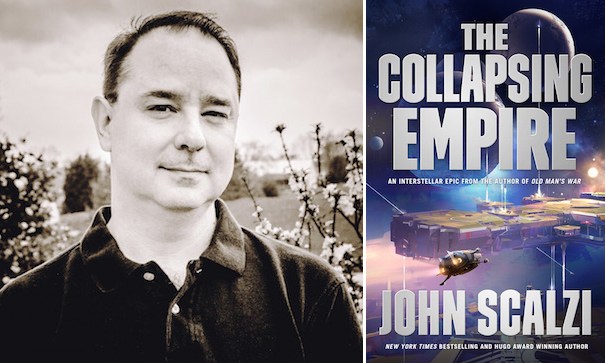John Scalzi made his reputation when he serialized Old Man’s War online, and attracted a huge readership and the notice of Tor Books’ Patrick Nielsen Hayden. Now he’s tackling a brand new space opera, The Collapsing Empire. He recently spoke with the good folks of The Verge about his new book, the future of publishing, and the power of optimism. Check out a few highlights below!
Scalzi talked a bit about making sure his new space opera forged a new path. First, he’s drawing on the “golden age” of exploration to deal with an Empire as it runs into a major setback. The civilization of The Collapsing Empire relies on an alternate dimension called The Flow, which has allowed the populace to travel long distances… and has also resulted in planets forming a completely interdependent web of supplies and trade. In pondering the way that Europe used ocean currents and wind power to travel to distant lands, it occurred to him that a space opera would be a great site to explore. “…what would have happened to that exploration, exploitation, and trade in an age of sail power if — for some reason not well understood by the humans at the time — those ocean currents just… went away?” In the case of The Flow, a collapse can mean that an entire planet is cut off from vital supplies.
He’s also given the book three equal protagonists, with three very distinct worldviews:
Kiva Lagos, the starship owners’ representative, is profane, sarcastic, and kind of punchy. Cardenia, who becomes The Emperox, is more tentative, and Marce is more observing and taking notes. So it’s not only writing separate characters, but writing the way they apprehend the world.
Scalzi spoke at length about his own history as an author, his deal with Tor books, and what he sees as the future of publishing. Because of the contract he signed with Tor Books, he’ll be publishing 13 novels over the course of the next decade, which has given him a sense of freedom. “Rather than a burden of, ‘Oh my God, now I have 10 books to write’ — or 13 books, because it’s 10 adult and three YA — it’s, ‘Oh boy, now I can write my books, and I don’t have to worry what happens to them from there.’” This has also led him to develop a theory on the three types of authors: dinosaur authors, mammal authors, and cockroach authors. He allies himself with the roaches:
The dinosaur authors are wedded to a format and distribution system that is waning, so the fortunes of their career will go out with it. So if you’ve always been someone who sold books through supermarket racks, when the supermarket-rack consolidation happened in the ‘70s, that was bad news for you. Same if you’ve always been wedded to bookstores. Borders closes, that’s going to be trouble for you. Mammal authors ride the wave of a new publishing paradigm, like the authors who are pure digital. That’s going to go great for them until it doesn’t. Then there are the cockroach authors, where it doesn’t matter, they’re going to do just fine, because they’re always going, “Wow, is this what people want? Let’s try this and see how it works, and adapt to it.”
And despite all of the shifts in the publishing world, Scalzi remains confident that there is room for novels, audiobooks, serialized stories, and novellas:
Nothing ever gets completely replaced, either, you know? The novel isn’t going anywhere. People do like novels, books of 60,000 to 120,000 words or whatever, they like that length, the rhythm of that particular thing. And that’s great. Certainly assume I will be writing those indefinitely, as long as there’s a market for them.
Possibly the most heartening part of the discussion, however, came when Scalzi was asked about the future of science fiction and fantasy:
I’m optimistic about science fiction because we have this multiplicity of voices. It’s not just me, or George R.R. Martin, or Brandon Sanderson, or James S.A. Corey. It’s N.K. Jemisin, Alyssa Wong, Charlie Jane Anders, any number of people who in a previous era would have struggled to make their voices heard. And instead of them struggling, they are at or near the top of the field…. I feel optimistic that we have affirmed ourself as a genre that says, “We are open to anyone, and anybody can excel in it, and anybody can tell a story.”
You can (and should!) read the entire interview over at The Verge!










